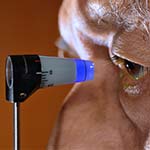(07) 5655 2156
Mon - Fri: 9am - 4pm
Sat - Sun: By Appointment
- (07) 5609 6020
Gold Coast Private Hospital
Suite 3, Ground Floor
14 Hill St, Southport Qld 4215 (Directions)
Mon - Fri: 9am - 4pm
Sat - Sun: By Appointment
Suite 3, Ground Floor
14 Hill St, Southport Qld 4215 (Directions)




What is Glaucoma?
Glaucoma is the name given to a large group of diseases which ultimately affects our optic nerve, which is in the back of the eye and transmits our visual information to our brain. The optic nerve becomes damaged through a loss of central nerve tissues in the middle of the nerve which translates to a loss of side or peripheral vision. This damage is permanent and cannot be reversed once it has occurred. Most people are not even aware they have Glaucoma until they have seen an eye specialist and therefore it is very important to have regular eye checks to ensure that any Glaucoma is diagnosed early before severe and irreversible loss of vision occurs.
Risk Factors for Glaucoma
Glaucoma has traditionally been linked to elevated intraocular pressure of the eye, or the pressure inside the eye, but Glaucoma can occur in people with high, normal or even low intraocular pressure. We now know that there are many other risk factors for developing Glaucoma such as a family history of the condition, being short sighted, migraines and other medical conditions and medication use. Conversely, some people may have a high intraocular pressure, due to other conditions in the eye such as trauma, infections or inflammation, but not have Glaucoma. Your eye specialist will talk to you about this in detail at the time of your consultation.
Treatment of Glaucoma
Open Angle Glaucoma
There are many types of Glaucoma however the most common is called open angle Glaucoma and this is the type that most people are not even aware they may have or be at risk of. In Open Angle Glaucoma, there is no blockage of the drainage of the fluid of the eye but damage still occurs to the optic nerve. In these cases, treatment is focused on lowering the intraocular pressure in the eye to protect the optic nerve from damage. Initially, treatment options include drops into the eyes or laser treatment called SLT (Selective Laser Trabeculoplasty). Both are equally effective in the first instance in managing Open Angle Glaucoma. Your Specialist will talk to you more about what is most suitable for you.
Sometimes surgery is required to assist in the management of Glaucoma if drops or SLT are not working or not suitable. In recent years Cataract surgery combined with small stent like devices inserted into the drainage angle have shown to be effective in lowering the intraocular pressure for a longer period of time. Other operations, known as incisional surgery, such as trabeculectomy or ‘tubes’ may be required
Closed Angle Glaucoma
Closed Angle Glaucoma is much less common and due to a sudden blockage in the fluid drainage angle of the eye. People often present with symptoms of severe eye pain, headaches and cloudy or sudden loss of vision and if you notice an of these or are concerned you need to see an eye specialist immediately. Closed Angle Glaucoma is managed very differently than Open Angle Glaucoma and often a PI or Peripheral Laser Iridotomy is needed to create an alternative drainage pathway for the circulating fluid in the eye. Cataract surgery may also be recommended as this is the most common cause for a person developing angle closure glaucoma.
Monitoring of Glaucoma
Glaucoma is a chronic disease for which you will need to be monitored for the rest of your life. Investigations that help your specialist decide if your Glaucoma is stable or progressing including an OCT, or high resolution image of your optic nerve. Other important investigations include a Field Test, which involves a test of your many different points of your vision, particularly your peripheral vision. Your Specialist will discuss with you how often you need to be seen and how frequently you need these investigations based on your own individual circumstances.